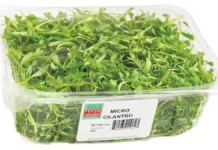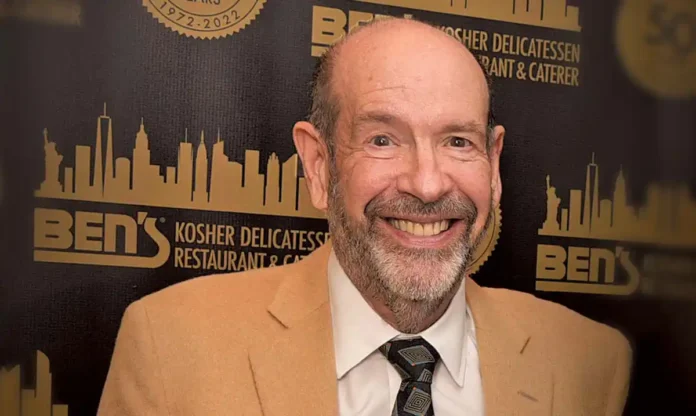
Founder, Ben’s Kosher Deli
For the thirty plus years that Total Food Service has covered the Metro New York restaurant scene, there hasn’t been a trade show where we haven’t seen the deli maven Ron Dragoon walking the aisles and holding court. It’s that very same energy that has made Ben’s Kosher Deli an iconic Long Island and Manhattan landmark.
Through Hurricanes and Pandemics, the Deli Maven has persevered. With that, Ben’s Kosher Deli is celebrating its 50th birthday this year. As with many operators, 2022 has been all about supply chain problems, leading to kosher meats, at times, doubling their price. Plus, there has been a severe backlog getting bologna, salami and knockwurst from distributors. But from carnivores and their hot pastrami to the addition of a plant based “corned beef” sandwich, Ron Dragoon continues to persevere by listening and responding to the needs of his legions of customers. The 73-year-old Dragoon has long been known as a master promoter. This year he is saying thank you to patrons with special deals throughout the year, such as a $19.72 meal for one, or a $50 family package.
From 100 plus hour work weeks to an understanding that “every generation removed from the immigrant experience is less loyal to the kosher deli,” Ron Dragoon gets it. Total Food Service wanted to hear his reflections on half a century of serving the Metro New York community and his vision for the future.
For those who don’t know Ben’s, can you share a background of how it all began?
I had graduated from Brooklyn College where, by the way, the price was right. Then I had a tour with VISTA (Volunteers in Service to America). It was an anti-poverty program designed to provide needed resources to nonprofit organizations and public agencies to increase their capacity to lift communities out of poverty. Then I came back to New York and started working with my dad.
What led to an interest in the restaurant industry? What was the opportunity that you saw?
Well, through college I worked in my dad’s small store on West 72nd Street in Manhattan. And I literally and figuratively cut my fingers in the business that time. This is 1971-72, I found that I really liked the business; I was passionate about it. And the overriding piece of all this was that I wanted to be successful, no matter what I did. And because as a kid, I lived in eight different places by the time I was 14, I didn’t have a high opinion of myself, there’s a lot of insecurities surrounding that. I didn’t think I could be a good lawyer and I figured, let me do something that I feel comfortable in. And that’s what I did. My dad and I opened the store in 1972, right after the Jewish holidays. Within a year, I bought my father out. I got a quitclaim deed, because it was going to go nowhere. Through the years, I said, my father could sell the Brooklyn Bridge to the same person twice but running a business simply wasn’t his thing. I made a deal with the landlord to forego an immediate rent increase, and because he saw how hard I worked, he agreed to it. Within 6 months with all of the bills paid up, I went to my landlord, and told him to start charging me the higher rent. He was rewarded for being a really good judge of character.
What were folks eating in 1972?
I actually think corned beef exceeded the volume of the pastrami, and brisket as well. There was less turkey in those days, but now it’s the premier sandwich at Ben’s: fresh roasted turkey.
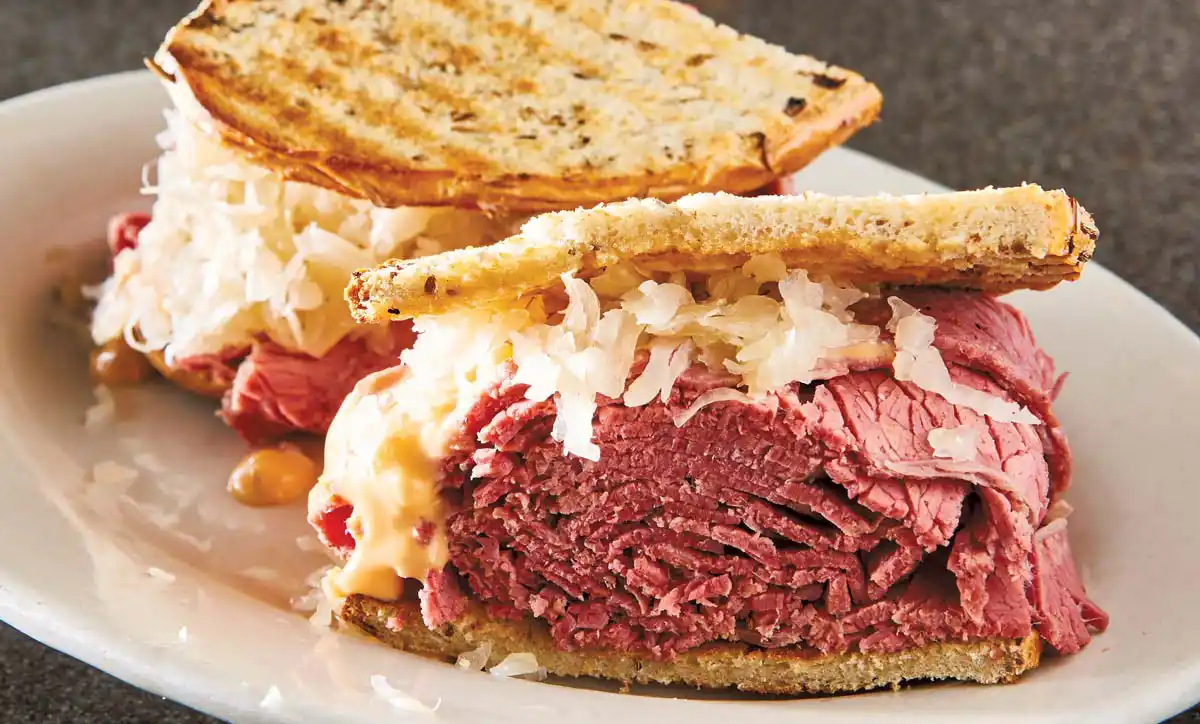
We’re going to get into that in a second. I’m assuming that there was a significant amount of competition in those days?
Yes, on Long Island there was probably a kosher deli in every town and every village. In New York City, there used to be three in the same street. We began in Baldwin and we won our first battle with a deli in North Baldwin in ‘73 when they closed. Oceanside, Merrick, Belmar, every South Shore town had a kosher deli.
What did you have to do to be different? Or was there just enough business for everybody anyway?
I went into this business having a totally different take on the business. And I knew then that I’d have to be in the restaurant business, not the delicatessen business. I saw the handwriting on the wall.
What’s the difference?
First of all, there are higher margins in the dining room than there are over the counter. And the other thing is, customers were accustomed to kosher delis having Formica tables and walls. That made for a rather uninviting dining room. I hired professionals because I believe in professionals. In 1976, I expanded and the question, I asked was if I got to a point where if I do no more business, and have to pay additional rent for an expanded space, will it still survive? And I said, Yes, one because I wasn’t a big spender, and I was working seven days a week, so there was very little time to spend any money anyway. I put my head down and I just kept working. I believe I had an engaging personality. I was a workhorse and there wasn’t anything I wouldn’t do for customers; I’d jump hoops for customers. We’ve stuck to that and it has stayed with us although it can be difficult at times.
Talk a little bit about the decision to hire professionals to make your vision a reality.
I hired a dining room, menu professional company called Design Unlimited, they were located on Long Island, he was a very talented individual. Then I hired a design architect. I didn’t do this for the cheapest, I did it because after interviewing people I knew what I wanted. And that’s what I did, I hired a menu company, I hired a professional architectural and engineering firm, in 1976, I expanded Baldwin. And again, I took the position, if I do no more business, and have the additional rent, will I survive? And I said, yes. Truth be told, when I opened the expanded location, I doubled the business.
How did you do it?
I don’t know. I think people knew I was hard working. I think they knew that whenever I had any spare money, I would upgrade the stores. I paid attention to the details like artwork on the walls. And I think they saw that, they saw how passionate I was about the business, how hard I worked, and they knew that I would do anything for customers.
What’s an example of doing anything for a customer?
A customer called me up one time, there was a bagel store right next to my first store in Baldwin. He called me up and said, Ronnie I’m not going to make it onto Long Island, I’m in the city, could you buy a dozen bagels for me next door in the bagel store? I’ll get home about 9 o’clock the bagel store will be closed at 8 o’clock. I said of course I’d do that, I went to the bagel store, got assorted bagels a dozen, put them in a bag, stapled it together so it wouldn’t be part of Ben’s. And when the gentleman came in, I think at 9 o’clock, I was closing, I handed the bag I got paid for it and he said thank you.
One time a customer was also working in the city, and he had a small child at home, he said, Ronnie my wife needs milk. At that time the supermarkets were closing at 9 o’clock at night. There was no such thing as a 24-hour supermarket as far as I know. I went to the Waldbaum’s that was next to me in that same shopping center, I bought a quart of milk, or a gallon of milk, I forgot what he asked for, I put it again in a bag I stapled it not to be used at Ben’s, put it under the counter, when the gentleman came in, he came in about 20 after 9 and I was still in the restaurant reconciling the day’s business. I gave him his milk, he paid for it. I engendered loyalty because my attitude was, let me go out of my way for customers because there’s going to be a time where Ben’s makes a mistake and I don’t want them to crucify me. And they won’t crucify me if they know that in the past, I did everything I could to satisfy them.
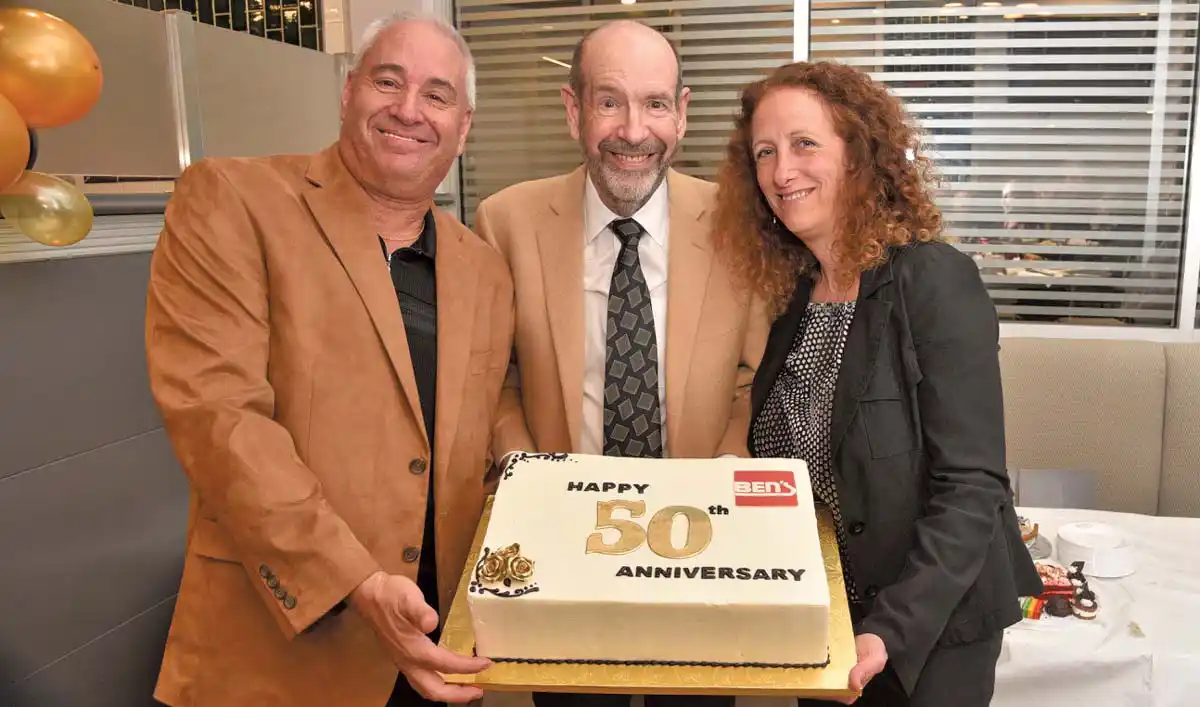
Is it tough working for somebody like you that is so passionate and has set the bar so high?
I think it was a good thing. In fact, when I did exit interviews with some of the people who retired, because depending on length of time served in the restaurant, they would get anywhere from 2 weeks to 4 weeks vacation. And I was proud of the fact that many, many people at Ben’s were getting and are still getting 4 weeks vacation, which means they’re longtime employees. I had one employee who retired, and I sat down with him for lunch in the restaurant in Baldwin and I said, “What kind of a boss was I?” He said, you were demanding but you were always fair. And I took that as a positive. I did raise the bar, and I was demanding, but I was more demanding of myself than I was of anyone else. And it was no job that I wouldn’t do that I ever asked anyone to do. I don’t care if it was cleaning the bathrooms.
As you see labor costs spiral to the point that we have $17/hour dishwashers, does that annoy you?
I think the old paradigm has to be thrown away. It’s no longer the labor cost that we were accustomed to, now it’s very clear that labor costs fall in 35 to 38%. What you have to do is you have to raise pricing to a point where you can make that up with a $17 an hour dishwasher. I don’t begrudge that. I think it’s a good thing. The only thing I said when this was happening, I said, you realize at some point that the customers are going to have to pay the freight, and that’s going to impact the people who make $17 an hour, it’s not really $17 an hour anymore. And I always knew that, I said, it’s a misnomer, it’s not really what they think it’s going to be. When Bernie Sanders talked about 15 bucks an hour, I had no objection to that. What I have an objection to is, as long as we’re all on the same playing field, I don’t have an issue. Because if I’m paying $17, that restaurant down the block is paying $17. We’re all in the same boat, we have to find a way to make it all work. And I’m not saying it’s easy, because trust me the pandemic has changed the business entirely.
Talk about what life in March 2020 looked like and the experiences of the Pandemic.
It was very difficult. If it wasn’t for the PPP loan money, I don’t think I would have survived this. Because I wanted to keep people on the payroll, I don’t take terminating people or laying people off as a way that I want to go. That’s not the way to handle this business. I wanted to try to make it work for the customers, for the employees, and lastly, for me. And that’s the attitude I took. In Manhattan, I actually closed the store for five months. I made a deal with the landlord to give him X amount of dollars while it was closed, because I felt it was worth the investment to keep it open for the five months and see how everything panned out. The truth of the matter is, I’m doing about 62% of the business in Manhattan that it was doing pre-pandemic. And so, I’m actually supporting that operation from the other stores.
How did the Pandemic impact your takeout and delivery business?
We had a big advantage because it has always been a significant piece of our business. That’s the advantage I had over other restaurants. We had the packaging available. We had everything in place to make a relatively easy transition. Because a deli’s counter business is all about the same efficient prep and packaging needed in Takeout & Delivery.
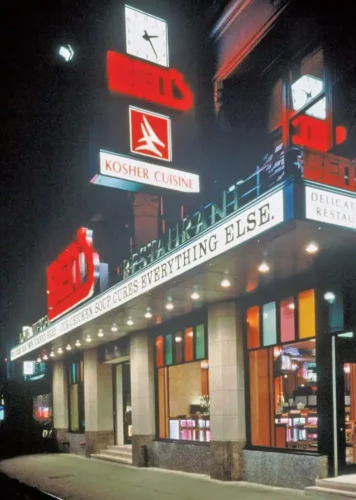
Catering took a hit, of course, but what I did do is I bought lunchboxes 4000 at a time that are heavy cardboard, corrugated cardboard. And what we did, the hospitals loved it, the first responders loved it, because we had people sponsor meals to hospitals, to the firefighters, and we put every 1 in an individual box, which was a great thing. We went through 4000 meal boxes, and they cost about $1.25 each now, when I first started, they were about 75 cents. It’s a beautiful box, you could stack 20 high, because it’s such a gauge on the corrugated cardboard. It could take a stack way high. And that’s what we delivered to all the hospitals, to the emergency rooms, to nursing homes, and people loved it and they sponsored it. And it was also a discounted price, we didn’t get our full price, it was a mitzvah for everyone, and we ingratiated ourselves in the thoughts of everyone. And they remember that, not that it’s post pandemic, but maybe it’s pre post pandemic. And they’re patronizing the restaurants I think as a result of some of the good deeds that we did during the pandemic.
Everybody in the industry complains about the cost of Grubhub and Uber Eats, what are your thoughts?
I was always a believer in controlling my own destiny. Call it manifest destiny if you will. I really didn’t like either of them from the start but I knew we had to use them. I did it in Manhattan first, and I did it in Bayside secondarily, and I never liked it because they were charging these ridiculous numbers. I would look at the Grubhub/DoorDash statements and ask my CFO, if the 15% was for real. A restaurant can’t survive paying someone 15% of the bottom line, it just doesn’t work. In my best years, I had a 3.9% net, you don’t have that much room to be paying someone 15%.
As a result of that, have you built your own app and created your own tech?
We always had drivers because we always delivered. Each store had at least one and possibly two deliveries. And if one of the Ben’s locations had one delivery person, we would train someone to be a secondary driver. In the stores that have two drivers, we added a third, there was a designation, if there’s multiple deliveries at the same time in different areas, we go to the third who works as a counterman and then can jump in and take a
catering order.
How have websites and technology become an important part of what you do?
We have a website that we are continually upgrading. Our real focus is on trying to move people from DoorDash to our Ben’s app and our in-house delivery services. We’re using Grubhub, in many cases, through their app for people to order and pick up and sometimes they deliver it. Now that they are charging 5%, I can tolerate it. If enough restaurants got together and applied enough pressure to people like DoorDash who charge 15% or even 10% in some cases, change will come. But restaurants have to band together and fight that because they’re not going to survive. I’ve noticed that many of those virtual restaurants that have done these third-party deliveries, or takeout, they don’t last. I’ve seen them go out of business.
How does Ben’s stay relevant with what is now a third generation of
customers?
Because I’ve been in business now 50 years, I’ve taken care of probably three generations. I always said that every generation removed from the immigrant experience changes the loyalty and patronage of our base of customers. And when I was a kid growing up, I wouldn’t eat Mexican food, not that I don’t like Mexican food, it’s just that it was never an option. Now there are so many options that people have for dining out or take out, add that to the loss of the loyalty that first and second-generation immigrants had towards Ben’s. Our delis were a second home for many of our customers. It served as a community center after the synagogue. And they used to meet at Ben’s to have conversations. It was like a meeting hall.
What do you do to stay relevant? Do you change the menus and add things like plant based items to the menu?
We’ve been doing this for the last 8 to 10 years. We’re reconfiguring the menu and I’m not finished with it. For example, we have avocado toast with grilled pastrami on it as an appetizer. I don’t think any kosher deli has it, I don’t think any deli has it. We have a plant-based menu and what we’ve done is we’ve had different iterations of the plant-based menu to see what sells and what doesn’t sell. We also have vegan corned beef from Mrs. Goldfarb’s that many of our customers are enjoying. She was on Shark Tank, and Mark Cuban invested in it. And once I heard that Mark Cuban invested in it, I said I’ve got to try this stuff. She sent a sample and I can’t believe how much we’re selling.
It’s admirable that you still have an open mind and you’re still listening to your customers and you move in the direction that they want.
I even keep gluten free bread in the freezer after a woman brought in her own moldy loaf. Beside the vegan corned beef we’ve added a veggie burger. I’m even toying right now with eggs that are plant based. It’s all about having an open mind. I learned that lesson early on when a guy came to work for us, and I saw him slicing the meat all wrong. Turned out, he had been cutting meat “with the grain” for 40 years. I learned then that you need to keep listening.
What are your thoughts on the changes in how a restaurant markets its brand?
When I started in the business, there was no such thing as the internet or a website, everything was print media. Today it’s all about social media. In fact, I enlisted my daughter, who was a schoolteacher in New York City until she got married and had kids, and is now a stay-at-home mom. She’s doing social media and Instagram for me. And we have a marketing coordinator in our corporate office. I’ve always listened to people. The first time I interviewed a PR advertising firm was in 1975. Having been in business only 3 years, but I saw what I needed. And I call this person who was recommended by someone who worked for Cue Magazine at the time. Funny she came to interview me and she didn’t want to take my account but after a half an hour of conversation I convinced her otherwise. And actually, she was with me for about 25 years.
So is brand building all about the food, the ambiance, being part of the community, the packaging, etc.?
All of the above. I believe that a successful bottom line will come from building the brand properly. If it costs me more money to build the brand, I would rather do that than have that money in my pocket. It was a different animal in the early days.
There was actually a Deli Dealers Association and I was the youngest member. In fact, the deli business was so big that there were two different organizations. One was from the Bronx, and one was from Brooklyn. I’d go to the meeting and they looked at me as if I was a bit strange. In 1976 I believe I was the first restaurant in Long Island to have computers installed. Because even though I’m a technological neophyte, I knew the value of it and interestingly enough, when I put the computers in, there was no more shouting, just efficiency.
And another $500 of weekly profit. It took only one year to payback, before too long that expanded onto a scanner that enabled us to easily slice, weigh and label our deli meats.

You grew your business during a period when relationship not price was king, or at least a part of the equation.
There were guys like John King at J. Kings who we worked with for 25 years. I’m a very loyal customer for those companies that treat me right. And the ones who treated me right were the smarter companies. Because I paid my bills promptly and that gave me leverage. The issue now is that many of the guys like King have sold to SYSCO, or like Hebrew National to ConAgra and Borax to Imperial. All great companies but the relationships change.
What were the keys to expanding from a single unit to 10 stores?
The most difficult part of my journey was going from one operation to a second location. I was an engaging personality and people knew there wasn’t anything I wouldn’t do, but you can only be in one place at a time.
Going from one store to a second store, I had issues. And I said I can’t do this to myself. It’s bad enough I was working seven days a week for seven years without a day off except for the Jewish holidays when we’re closed. But I couldn’t take the pressure of people calling me from Baldwin, taking catering orders while I was trying to build a catering business up on the North Shore of Long Island, where I built my second store. And that was so difficult.
How did you do it? How did you replicate yourself?
I started by teaching my wife this business early on. One of our countermen couldn’t work on a certain day and I was the only counterman, you can’t work takeout orders and the dining room with one person. I taught my wife first to take customers, then I taught her how to slice meat, and then I taught her how to make catering trays. And honestly, she’s better than anyone that I’ve ever had and faster than anyone I’ve ever had. And I taught a whole cadre of young kids how to make platters. These were when kids wanted jobs, talking about 30 to 40 years ago. We simply figured it out.
Passion and enthusiasm can only go so far. Who runs the show from restaurant to restaurant?
I hire talented general managers. The funny line was, when we used to have Deli Dealers Association meetings, they once asked a rhetorical question, ‘Where were all the Jewish countermen?’ and the reply was, they’re all working for Ronnie at Ben’s. I had all these old timers, it was that family kind of an atmosphere. Now, of course, that’s gone, they’ve all retired or passed away. Many of the newer countermen are Hispanic. In fact, many of the countermen when I first was in business spoke Yiddish, and now that has been replaced by Spanish.
How do you teach that hospitality to a very different generation today?
What they don’t make up in personality, because of different backgrounds, they make up in work ethic, and they work hard. That works also. And of course, again, the generation is removed from the immigrant experience, very few customers at this point speak Yiddish, and very few customers care about the back and forth. They simply want great food and service They’re used to a different world.
You were way ahead of your time with tip sharing.
I had this notion that it would work. But you need to understand is that greed drives many people. My great social experiment with tips simply didn’t work. We went back to a capitalist system, and everyone was in it for themselves, which did improve the service by the way, much to my chagrin, and much to my consternation, because I always felt that people work together, they can pool their tips, I was sadly mistaken. That’s why to this day, I call myself a pragmatic progressive.
Do you see a growing Jewish population that will support these restaurants going forward?
Yes, that’s why we have 18 rabbis on staff covering all the stores. I actually commissioned a study with a survey company in Connecticut, about 15 years ago, about the importance of kosher. They told me that 25% of repeat customers come to Ben’s because we’re kosher. There’s a subset that says, ‘Well, we feel more comfortable’. And honestly, I think it was about 65% that didn’t care. Now going home was different. If we did catering, that percentage grew because they felt more comfortable with kosher food in their home. I think we have positioned ourselves properly for the future.
How has the growth of the Orthodox Jewish population impacted your business?
The modern Orthodox will come in on occasion. I watch what they eat, usually chicken or salmon. Overall, the growth of the orthodox population has hurt us because they opened up a number Glatt kosher stores. But based on the number that have closed, they misread the challenges of operating a restaurant. Because the cost of goods is so high. I found out from someone what a Glatt kosher brisket cost, my brisket cost $5 a pound, theirs is $10-11 a pound? Well, what are you going to do, charge a customer $50 a pound for corned beef?
Why is it so important that you know margins for this is 38%, and that’s 3 1/2%?
Because you have to plan. If you don’t plan up to 6 months to a year down the road, you’re never going to make it.
As you look in your crystal ball, what do you see?
There is no joy in watching so many legendary kosher delis like the Stage and Carnegie close their doors. It bodes well for Ben’s because there’s not as many options for kosher delicatessen restaurants, even for Jewish deli restaurants anymore. The business model of paying excessive rent simply doesn’t work. We all know what is going on with the cost of labor and what inflation has done to food costs.
The only way you can keep up with the product costs is to raise pricing. I’ve always disliked that and I was always last to raise prices. In fact, someone came in the other day. And they said, we just ate at Pastrami Queen in Manhattan and paid $24 for a corned beef sandwich. I was downstairs in the restaurant, I looked at my board and it said $13.99. I try to keep the prices in line even though the public is always moaning that the prices are too high. But when you compare me to other operations of the same build, I’m not that high.
Takeout & delivery are great but what we need to do is to fill the dining rooms again. We are committed to different menus including plant based. Again, the key to our long term growth is creativity. We’ve actually built a new niche with meal kits through a number of synagogues across the East Coast. Our Ben’s in Boca Raton, FL actually services congregation members from as far away as Jacksonville. In Manhattan, we are focused on our outreach to 250 plus tour groups that want a true New York kosher experience.
To learn more about Ron Dragoon and Ben’s Kosher Deli, visit their website.























